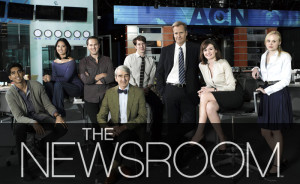I’ve been watching The Newsroom during its first three weeks of life and, much as many felt The West Wing was Aaron Sorkin’s tonic during the George W. Bush years, The Newsroom is his tonic for today’s news-as-rating’s-driven-entertainment culture. Why report on important things like the economy when stories about Snooki’s most recent nip slip sell better? I feel like the American public, me included, is like the dog in the Pixar movie Up!, constantly sidetracked by a non-existent squirrel.
For historians, one interesting decision Sorkin made when he wrote the show was to back-date it by two years. Thus, whenever there is a moment of high tension between characters, all of a sudden Gabrielle Giffords gets shot in the head and the characters return to business–and learn to like and respect one another again. Or the Deep Water Horizon blows up. Or something from the recent American past invades the narrative and we end up with a history lesson about the recent American past.
It’s an interesting technique, and a bit jarring. It’s also in true Sorkin-style a bit much. On the one hand, why do all these important events happen at the exact moment one character is about to reveal why she cheated on him? Come on! What timing! On the other hand, Sorkin tries in his typically didactic way to show us how the news media should have reported on these signal events, and therefore how we should view them today.
In a way, Sorkin’s news in The Newsroom really is a first draft of history. Not only reporting the events as they happen, but also showing a bit of perspective that only emerges with time. When CNN misreported that Giffords had died in the shooting, for example, the team at The Newsroom decides to wait for a second source, and turns out–tada!–to not have misreported the tragedy. When the anchorman, a crusty bachelor and registered Republican played a bit meanly by Jeff Daniels, goes after the Tea Party for losing its grassroots anchor to the Koch Brothers agenda (and money), he’s making an argument about how we should interpret the development of the organization.
From a teacher’s perspective, this is what we try to do. We try to explain an event from the past, not only by telling the details of the event, but by understanding motives and outcomes, both expected and unexpected. Then we try to fit that event in the larger narrative of the past. If only we were as slick (and rich) as Aaron Sorkin.
What do you think? Sorkin’s a lefty, no doubt. But he’s making an argument that being a lefty today has become siding with the truth. A bit much? How much will he color our understanding of the recent past? Is TV the first draft of history? If so, how can we compete?





Very interesting comments. I’ve been watching since it started and was immediately taken by the writing and the closeness of its historical events. It is quite jarring. I’m hoping that those watching at home will see it for more than just liberal Hollywood soap-box TV as you pointed out. Not sure what the reception has been. The show does indeed resemble a first draft of history- a very close first draft of very recent events. My advisor at Drew University calls this type of work “history of the recent past.” I think it’s also one of the first times I’ve witnessed events of the past on a TV show that I’ve lived through- an experience quite common for others but not so much for my own viewing experiences. The opening of the show is also interesting as an example of historical consciousness as it ebbs and flows through history via images and video as we hear a feature-like opening title sequence fit for the big screen. I’ve wanted to write something on this show, but am busy trying to work through my program, ha. Religion/Xnity’s appearance in the show could also be a point of discussion- scant as it is. Very much enjoyed your “Tri-Faith” text and review essay in JAAR!
Anonymous: Thanks for the nice comments! Great to hear, always, and something our profession doesn’t always do a great job with. So thanks so much. About the show, I lost HBO (too cheap) for a few months but am back playing catch up. I too find the immediacy a bit jarring and, it seems, it’s falling off, which is to say, there have been in the middle episodes fewer oil spills or congress people getting shot, etc. We still have Tea Party stuff, but the plot between the characters seems to really have taken over. If I’m wrong, don’t tell me! I’m still playing catch up. When you get around to writing something about it, please share.
All best,
Kevin